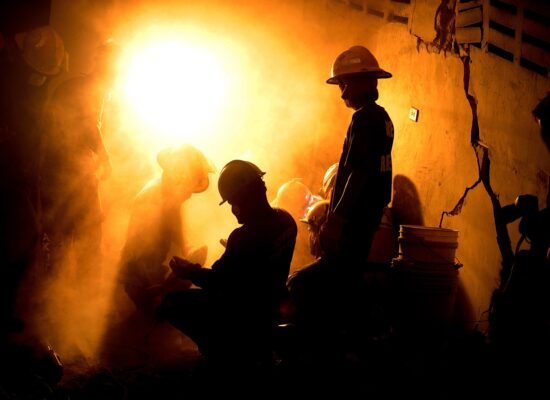Die Risikoanalyse von Veranstaltungen gibt es nicht erst seit der Pandemie, auch wenn diese den medizinischen Faktor besonders in den Vordergrund gestellt hat. Jede Art von Veranstaltung, ob ein kleines Sommerfest oder Großveranstaltungen wie ein Konzert, birgt Risiken und kann sich zu einer unvorhergesehenen Katastrophe entwickeln.
Ein Beitrag von Marcel Hagens
Die Zahl der Besucher spielt aber im Endeffekt keine Rolle, wenn es zu einem Ereignis kommt, mit dem niemand gerechnet hat. In dem Moment wäre schon ein betroffener Mensch einer zu viel. Umso erstaunlicher ist das, was sich am 15. Juni 2021 in der Münchner Allianz Arena, die zum Zeitpunkt des Spiels Deutschland gegen Frankreich rund 14.500 Fußballfans beherbergte, ereignet hat.
Noch vor dem Start der Partie näherte sich ein Motorgleitschirmflieger dem Spielfeld und entkam dabei, einmal ohne es selbst zu merken, dem Tod. Denn zu diesem Zeitpunkt hatten ihn bereits zwei Scharfschützen der Terrorismusbekämpfung im Visier und warteten nur noch auf den Befehl zu Schießen. Bevor es dazu kommen konnte, wurde der Befehlshaber auf das Greenpeace-Logo aufmerksam und entschloss sich, darauf zu vertrauen, dass es sich tatsächlich um einen Aktivisten der Organisation handelt.
Aktivist im Anflug…
Sekunden später entkam der ‚fliegende Mann‘ einer weiteren Katastrophe: Die Drähte einer Spydercam, die im Inneren des Stadions über dem Spielfeld angebracht waren, bremsten den Aktivisten unsanft aus. Dadurch kam es zu einem unkontrollierten Abstieg, bei dem er – zum Glück – nicht direkt im Publikum landete. Trotz allem hat er bei seiner Aktion einen Mann verletzt.
Schaut man sich Aufnahmen des Vorfalls in der Allianz Arena an, erkennt man, wer den Aktivisten nach seiner Landung zuerst erreicht: entgegen der Vermutung, dass er vom Security-Personal empfangen wird, nachdem man bei der Landung zuschauen konnte und bereits bekannt war, dass jemand ‚im Anmarsch‘ ist, sind es Spieler der deutschen Nationalmannschaft, die auf ihn zulaufen. Sie wollen ihm helfen und werden dabei der potenziellen Gefahr ausgesetzt.
Vertrauen ist gut, klare Kommunikation ist besser
Die Terrorismusbekämpfung ist eine ernste Angelegenheit und ja, die speziellen Maßnahmen und Taktiken dürfen der Öffentlichkeit nicht offenbart werden. Eine allgemeine Kommunikation und Information für die Öffentlichkeit wäre dennoch sinnvoll. Wir würden sogar behaupten, dass es die Wirksamkeit der Maßnahmen erhöhen würde!
Stellen wir uns doch einfach nur vor, der Ball, den der Aktivist auf das Spielfeld fallen lassen hat, ist kein normaler Ball, sondern eine Bombe. Oder der Ball ist nicht mit Luft, sondern mit Nervengas oder einem anderen chemischen Kampfmittel gefüllt. Wie wäre die Situation dann ausgegangen?
Wer eine festgelegte Grenze überschreitet, muss die Konsequenzen dafür tragen. Dafür muss diese Grenze aber klar kommuniziert werden. Stellen wir uns einfach folgende Fragen:
- Hätte der Mann sein Leben riskiert, wenn er gewusst hätte, dass alles, was im Laufe des Fußballspiels, also in der Zeit von 17:00 bis 22:00 Uhr, in den Luftraum eindringt, vom Krisenstab als Gefährdung angesehen und dementsprechend abgeschossen wird?
- Hätte er sich trotzdem darauf verlassen, dass das Greenpeace-Logo sein Leben rettet?
- Wie und wieso konnte der Aktivist überhaupt in einen geschlossenen Luftraum eindringen? Er wurde wohl kaum in das Stadion teleportiert – warum wurde er also nicht von der Polizei oder Bundeswehr frühzeitig mit einem Hubschreiber abgefangen und aus dem Risikogebiet geführt?
- War die Entscheidung des Befehlshabers nachvollziehbar? Auch wenn sich die Entscheidung in dem Fall als richtig erwiesen hat – lernen Terroristen jetzt etwa, dass sie getarnt angreifen sollen, um Gegenmaßnahmen zu vermeiden?
Die Vergangenheit hat bereits gezeigt, dass eine Tarnung das gerinste Problem ist. Versteckte Bomben in Rettungsfahrzeugen, die zu einer vermeintlichen Rettungsaktion unterwegs waren oder Selbstmordattentäter, die als Polizisten verkleidet waren.
Im Umkehrschluss bedeutet dies, dass bei jedem Verstoß gegen vorgegebene und kommunizierte Regeln eingegriffen werden muss. Es darf sich niemand darauf verlassen, dass ‘gute Absichten’ erkannt werden und man beispielsweise als Aktivist keine Konsequenzen trägt oder wie in diesem Fall abgeschossen wird.
Das Schicksal kann jederzeit, an jedem Ort und in jeder Form zuschlagen. So wie ein Aktivist plötzlich ‘vom Himmel fallen’ kann, können wir von einem Feuer, Unwetter, Terrorismus oder einer anderen unvorhergesehenen Notsituation eingeholt werden.
Sind Sie auf einen Notfall vorbereitet, wenn dieser in Ihrer Organisation, Kommune, Ihrem Unternehmen oder während Ihrer Veranstaltung eintritt? Wir von WB Risk Prevention Systems stehen Ihnen zur Seite, um Sie bei der Vorbereitung auf mögliche Notsituationen zu unterstützen. Wenn Sie mehr erfahren möchten, können Sie uns hier kontaktieren.
Diese Situationen haben selten eine Vorlaufzeit. Es müssen also von vornherein alle möglichen Konsequenzen in Betracht gezogen werden, sodass man im Notfall direkt reagieren und die Folgen gering halten kann.





